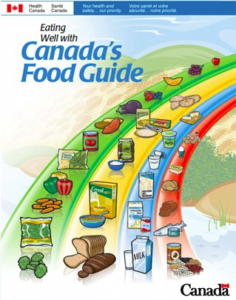
School bulletin boards and doctors offices used to be painted in the Canada Food Guide’s colours of the rainbow.
Eating healthy meant getting daily servings from each of the four food groups. A toddler running around the house needed four daily servings of fruits and vegetables, three of grain products, two of milk and alternatives and one of meat and alternatives.

But the country waved goodbye to those 2007 guidelines in early 2019 when Health Canada introduced a revamped food guide with a new set of rules.
It recommends a diet half filled with fruits and vegetables and mostly plant-based proteins such as nuts and beans—a sure sign that society’s views of eating healthy are changing.

On top of eating more plant-based proteins, the new food guide suggests choosing water over juice and pop, preparing more food at home, reading labels and being aware of food marketing that may influence your choices.
It’s been heavily criticized by the public since it came out in January, many of whom say it is not realistic.
Cade Deal, a 24-year-old kinesiology student at the University of Regina, follows a strict workout plan. He said the guide would not give his body the nutrients it needs to recover.
“You need a spectrum of vegetables just to accommodate amino acids you would get from one animal-based protein meal. A mixture of the two diets would be optimal (and the) cost doing just one or the other seems to be too high for middle class individuals or families,” he said.
According to the Food and Drug Administration (FDA), the body needs nine essential amino acids, which a person can only get through food. Complete proteins like dairy products, eggs and meat contain all of these essential amino acids.
Research by Halifax’s Dalhousie University said 52.4 per cent of Canadians say the food guide is not practical to follow: It is too expensive, does not fit their dietary needs or preferences and preparing food at home is too time consuming.
However, it also said preparing meals at home is an average of 6.8 per cent cheaper for a family of four.
Dairy Farmers of Canada nutrition specialist Joanne Gallagher said she is happy with the updated guide because it still lists dairy products as foundational foods, meaning they are part of a healthy diet.
“One of the interesting things about the new format is that often, consumers didn’t recognize those products as being a good source of protein. Identifying them as being good sources of protein is actually helpful because it was a challenge to get consumers to see them in that way,” she said.

A ‘health halo’ around vegan products
Maybe while watching your favourite TV show you have come across A&W’s commercial for their new Beyond Meat sausage and egger, and maybe you have come across convincing food documentaries on Netflix.
A Dalhousie University study conducted by food professor Sylvain Charlebois said society turns to family and friends, general research, social media, cookbooks and magazines and TV programs for nutrition advice before the food guide.
In the documentary What the Health, filmmaker Kip Andersen claims eating processed meat is like smoking cigarettes. It shows parents scooping up cancer sticks from a frying pan and serving them to children only three minutes in.
But dietitians are saying the film’s viewers are being fed misinformation, and that following the rise of veganism or vegetarianism is not necessarily healthier.
Registered dietitian and spokesperson for Dietitians of Canada, Kate Comeau, said there is no evidence to support that eating a strip of bacon, for example, is like smoking cigarettes.
“I think that you can eat a very nutritious vegan or vegetarian diet and I think you can eat a very nutritious omnivore diet. I also think you can eat a very unhealthy or non-nourishing diet in both of those categories,” she said.
“The difference isn’t the meat, it’s the choices you’re making,” said Comeau, adding she does recommend minimizing processed or highly processed meats.
“Just because it’s a vegan chicken wing doesn’t mean it’s necessarily better for you,” she emphasized. “I think there’s a lot of misinformation and maybe a health halo around some of those products that convinces you that they’re more nutritious.”
In 2015, the World Health Organization (WHO) listed red meats like beef, pork and lamb as a Group 2A carcinogen, saying they probably cause cancer. Processed meats like bacon, sausage and hotdogs are listed as a Group 1 carcinogen, meaning there is sufficient evidence that they cause cancer.
“The risk that they were talking about…was really relatively small,” said Comeau, adding the link between these meats and cancer is not a causation, it is a correlation. This means there is a mutual relationship between the two, but one does not necessarily cause the other.
A 2018 Dalhousie University poll said 7.1 per cent of Canadians consider themselves vegetarians and 2.3 per cent consider themselves vegans.
Those under 35-years-old are more likely to be vegetarian or vegan than those older than 49.
Comeau said some turn to plant-based foods because of the environmental impact. Others are rejecting meat because of intensive farming practices.
To cater to the rise of veganism, grocery stores are stocking more and more veggie burgers, almond milk and tofu to meet the demands of the rising Canadian health trend.















